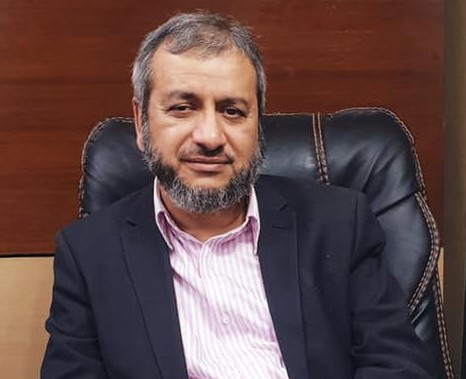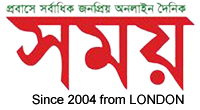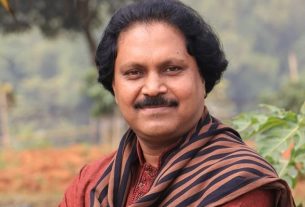Barrister Hamid Azad
London is in a celebratory mood as it welcomes Dr. Muhammad Yunus.
Yesterday, I visited Altab Ali Park, a historic venue cherished by the Bangladeshi community in the UK. This park has long been a place where Bangladeshis gather—whether to celebrate joyful milestones or to pay respects during solemn occasions.
Dr. Yunus, a Nobel Laureate, is not just a global icon of development and progress; he is also a beacon of hope for a nation that has long endured hardship. His current visit to the UK, described by many as a state visit, has brought people together in an extraordinary way. Regardless of race, colour, or political ideology, Bangladeshis from all walks of life gathered at Altab Ali Park to show their love, respect, and admiration for him. It was a true civic reception—spontaneous, heartfelt, and full of meaning.
I usually avoid attending politically charged public events. But yesterday was different. I went because:
• Bangladesh is my motherland, and Dr. Yunus has taken on a tremendous responsibility for its future at a critical moment.
• Dr. Yunus is my teacher, and I felt a strong moral duty to show him my respect and support.
• Bangladesh needs unity now more than ever, and I believed my presence could strengthen that unity.
• As a leader of a broad-based community organisation, I encouraged our members to attend and stand together in support of our nation.
What I witnessed was moving. People of all ages—men, women, youth, professionals, non-professionals—had travelled from near and far. Many elderly individuals and women had come despite their physical limitations. It was a testament to the deep love people feel for Bangladesh, their desire for peace and democratic progress, and their admiration for Dr. Yunus. The unity on display—transcending geography and political ideology—was both inspiring and reassuring.
However, I noticed something disappointing. While the presence of various anti-fascist groups and parties was clear, one prominent political party, which claims to uphold democratic values, was notably absent in any official capacity. Some of their grassroots members were present, but they openly criticised their leadership, saying the party was failing to understand the people’s aspirations and had taken a stand contrary to democratic principles.
Despite such concerns, the overall atmosphere was festive. People were celebrating, greeting one another, and sharing their hopes for a brighter future. There was genuine pride in seeing Dr. Yunus being honoured abroad, and deep appreciation for his tireless efforts to rebuild and unite a fractured nation. Many attendees expressed their anger toward the previous fascist regime, noting that its leaders remain unrepentant and continue to act in ways that harm the country.
I must also express concern about the role and effectiveness of the Bangladesh High Commission in London. They should have done more to support Dr. Yunus’s visit. A structured civic reception at a prestigious venue could have added great value. I heard they had plans to organise such an event but cancelled it at the last moment, citing security concerns. That decision reflects a disappointing lack of coordination and vision. Numerous capable community organisations could have helped create a historic reception had they been consulted.
Nonetheless, people stepped up. The event at Altab Ali Park—though informal and lacking structure, microphones, or logistical organisation—was beautiful in its spontaneity. Yes, some were frustrated by the poor management, but most were simply happy to be there, proud of their country, and energized by the presence of a leader they deeply admire.
I felt proud to be there. I felt grateful to reconnect with so many friends and well-wishers. And most of all, I felt inspired by the love and unity of the Bangladeshi diaspora.
To conclude, I humbly call on Dr. Yunus to:
1. Reform and restructure the administrative system to fix longstanding faults and inefficiencies.
2. Ensure a credible, fair, and democratic election is held as soon as possible.
3. Protect the voting rights of over 15 million Bangladeshis living abroad, who significantly contribute through remittances.
4. Create opportunities for expatriate Bangladeshis to contribute their talents and expertise to national development.
5. Identify and harness economic opportunities to strengthen the nation’s future.
6. Take urgent and uncompromising steps to eradicate corruption and crime.
7. Foster a culture of patriotism, mutual respect, and political maturity where differing opinions are welcomed and debated constructively.
8. Consult broadly with political leaders, creating an inclusive environment for consensus building.
9. Adopt the “Madinah neighborhood model” to foster social cohesion and peace.
10. Develop “Techno Villages” to unlock the potential of AI and technological innovation in rural areas.
11. Reform and strengthen Bangladesh’s foreign missions, ensuring they become efficient, people-centric, and aligned with national interests.
Once again, thank you, Bangladesh. Thank you, Dr. Yunus.
 * Barrister Hamid Azad Writer and Political Analyst, Consultant at Lawmatic Solicitors. Central President MCA
* Barrister Hamid Azad Writer and Political Analyst, Consultant at Lawmatic Solicitors. Central President MCA





